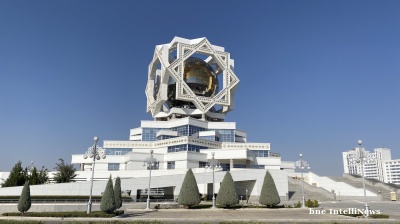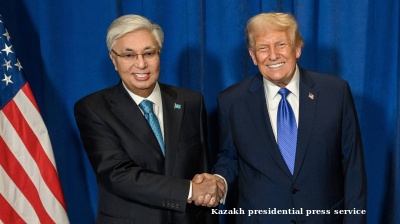Azerbaijan launched attacks within the Nagorno-Karabakh region on September 19. Although Azerbaijan labelled the violence as “localized anti-terrorist measures”, international actors raced to contain and end the conflict to prevent it from spreading and becoming a full-fledged war. Only a day after the fighting began, the United States removed its 85 troops from Armenia following military training exercises on September 20.
Following the first Nagorno-Karabakh war and dissolution of the Soviet Union in the early 1990s, alliance structures with Armenia and Azerbaijan were often viewed as stagnant: Armenia had Russia as a loyal ally, and the United States had competing interests from both sides of the conflict. But historical trends do not apply to the latest violence. International actors may have some sway in the region, but Russia’s has diminished greatly and the United States does not seem poised to peace keep in a meaningful way. Armenia has historically relied on international help in its conflict with Azerbaijan, but that help is largely absent now, placing the small nation in a unique and vulnerable position. Armenian President Nikol Pashinyan’s grip on power is weakening as some Armenians blame him for failing to keep peace, even as Russia and the United States are absent.
Much of the Armenian public perceives Pashinyan as an inadequate leader in his handling of Nagorno-Karabakh, which he effectively lost in the 2020 war with Azerbaijan. But he was once viewed as the face of hope in Armenia: originally a journalist, Pashinyan was imprisoned twice before being elected prime minister after the 2018 Armenian Revolution. Pashinyan’s popularity waned after the Nagorno-Karabakh war beginning in 2020. He signed a peace agreement that granted Azerbaijan control of areas surrounding Nagorno-Karabakh that was widely unpopular, and led to large protests demanding his resignation. When military figures called for Pashinyan’s resignation along with many in Yerevan, Pashinyan accused those opposing him of attempting a coup. Snap elections occurred for new leadership, but Pashinyan prevailed and remained in power.
Despite the blame towards Pashinyan in the previous and current conflicts, the odds of achieving victory were never in his favour. Armenian forces are relatively weak compared to Azerbaijan’s. With a larger population and a much more developed military, Azerbaijan outmatches Armenia, which was demonstrated in the 2020 war. Azerbaijan also has the strong backing of Turkey, a member of Nato and a country that the West has been reluctant to stand up against. Even as powerful nations such as France, Iran, and India back Armenia in different ways, in recent years, Armenia has failed to stand up to Azerbaijani military action. Armenia still relies heavily on international aid and mediation efforts for protection due to its inferior military capabilities. Despite the impact international actors have had in the conflict, the Armenian public has been harsh to Pashinyan as the conflict has worsened.
Regardless of what Pashinyan and his government can realistically do to maintain peace and protect Armenians in Nagorno-Karabakh, Armenians seem to place blame on him. According to polling conducted by the International Republican Institute between January and March of 2023, Armenian views that the country was heading in the right direction dropped from 62% between October of 2019 and May of 2021, when the second Karabakh war happened. Approval of the work of the Prime Minister’s office dropped in the same period from 76% to a mere 38%. Even before the latest violence, 69% of Armenians thought the policy of the government towards Nagorno Karabakh had worsened in the previous six months. Lastly, approval of the armed forces dropped from 91% in October of 2019 to 40% in March of 2023.
Pashinyan and his government would be right to fear that his approval could drop even more, as yet another conflict is breaking out that he was not able to prevent. Whether he will lose power entirely remains to be seen, but the weakest points of his support could feasibly become even weaker. Protests erupted the night of September 19 outside his office, as Armenians demanded his resignation.
Pashinyan may be in danger of losing domestic support over the conflict, but the changing roles of the United States and Russia explain the ongoing situation more holistically than Pashinyan’s abilities to prevent the conflict or win in the eyes of his population.
Foreign nations have historically been the main actors that (temporarily) have been able to halt conflicts between the two nations, whether through ensuring victory on one side or creating ceasefires. Russian assistance was a primary reason that Armenia emerged with a victory in the first Nagorno-Karabakh war. Vladimir Putin himself signed the ceasefire agreement along with Pashinyan and President of Azerbaijan Ilhan Aliyev in 2020. The United States and France also attempted to negotiate cease-fire agreements but failed.
Russian weakness in Armenia began to show in 2020. Armenians were reportedly dissatisfied with Russia’s failure to bring a peace deal that favoured Armenia. Russia also placed 2,000 peacekeepers in the region, but again failed, this time to prevent more conflict. Amid Russian failures to keep the peace, and distraction with their invasion of Ukraine, Pashinyan and Armenians have become less reliant on Russia, looking elsewhere for help. In a recent interview, Pashinyan noted that despite Armenia’s almost unilateral security reliance on Russia for arms and ammunition, it had recently been unable to provide assistance due to its own need for them in the Ukraine war.
While the United States has backed Armenia somewhat, at least rhetorically and through military training exercises, their power in the region to help Armenia is small. Pashinyan recently said that he hoped Armenia’s security relationships could change, even becoming closer to the United States and the European Union, despite being a member of the CSTO. The United States, however, has not made significant efforts to protect Armenia, or to make any security guarantees.
Russia is distracted with Ukraine and the United States has become closer with Armenia, but without notable results. Armenia is more vulnerable than it has been in decades. During the previous Nagorno-Karabakh conflict, Pashinyan’s inability to maintain control over the territory resulted in his approval plunging and resorting to snap elections to maintain his power. Though it remains to be seen what will happen to Pashinyan and his government, Armenians in Yerevan are already protesting against him. If history repeats itself, he will face political danger.
Features

Washington has a new focus on a Caspian energy play
For most of the last three decades since winning independence, Central Asia has been a bit of a backwater. Not any more. The Trump administration is becoming more focused on Turkmenistan's vast gas reserves and can smell money and power there.

BOTAŞ and Turkey’s hub ambition: from “30-year dream” to cross-border reality
For Ankara, the symbolism is as important as the molecules: Turkey’s energy map is shifting from end-market to hub.

Indian bank deposits to grow steadily in FY26 amid liquidity boost
Deposit growth at Indian banks is projected to remain adequate in FY2025-26, supported by an improved liquidity environment and regulatory measures that are expected to sustain credit expansion of 11–12%





